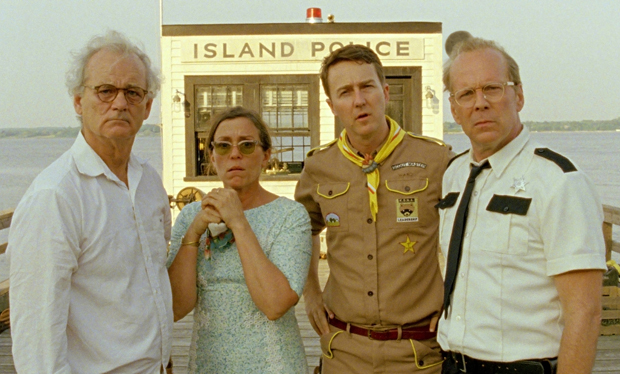
One of the early stand-out films of this years Cannes film festival was its opener, Moonrise Kingdom, by quirky American auteur Wes Anderson. Combining a vintage retro vibe with heartfelt performances from two young newcomers, Anderson continues his patented blend of humor and mise-en-scene with renewed vigor. The Film Stage was fortunate enough to attend a press conference for the film with some of the fantastic ensemble cast, including Edward Norton, Bob Balaban, Jason Schwartzman and newcomers Kara Hayward and Jared Gilman. They discussed what it was like working with the director, while Anderson and writing partner Roman Coppola talked through some of the creative inspiration that led to the film’s inception.
Kara, I know that reading is a big part of your character’s life and fantasy life, and I understand that you also write or write poetry. Could you tell us a little bit about that?
KH: Yes, I do. I enjoy writing poetry, short stories, and I have submitted some to some local competitions near where I live, and so a few of my pieces have been published…
Jared, is there anything you personally enjoyed that came into your character in the movie? Boy scouts or anything like that?
JG: Well my character’s very outdoorsy, and I’m outdoorsy. So yeah, I like running. My character runs a lot. I like to run. There’s that.
Running’s good. You don’t build fires? You don’t do anything like that?
JG: I learned how to cook over an open fire for the movie, and that was fun.
What was the best piece of acting advice Wes [Anderson] gave to both of you as first-time actors for a feature film?
JG: Really, I guess truly he always wants us to be been very natural.
KH: Yes. We don’t want to force ourselves into becoming our character. We want to be natural, and let ourselves sort of dissolve into the character.
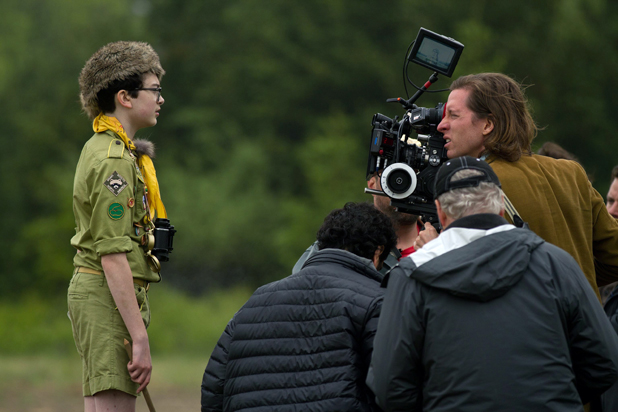
Love is a very strong emotion. I’ve just got to ask a sort of a personal question. Did either of you have any intensely strong crushes or even love yet in your life that you drew upon for the experience?
KH: Well, speaking from the point of view of a thirteen-year old girl, I don’t really think anything as intensely strong as the love Suzy and Sam had was experienced quite yet in my life. But there were, of course, for all teenage girls there have been these small crushes. Yes.
JG: Yeah, I guess there were crushes and that kind of thing. But I don’t think there’s anything like Sam and Suzy.
This is for you, Kara. When you discovered that pamphlet about troubled children, why do you think the character doesn’t talk to her parents about it?
KH: I think Suzy doesn’t really speak to her parents about how she is feeling because she doesn’t believe that they are listening, because they are always off doing their own thing. I mean, the mother is having her affair, her father has got his own worries, the little brothers they simply don’t really like her, so she just doesn’t really feel like anyone is going to listen to her until she meets Sam. Yeah.
What is your advice to young people, young actors, what is the most important thing about acting?
JG: I guess really it’s just to never quit, always be kind when you’re nominated, always keep trying. Don’t be discouraged.
KH: And, when you find something you love to do, such as acting, you have to go out there and try new things. I never really knew that I wanted to be an actress until I began acting in the role of Suzy. That’s when I truly found my passion for the art, and so I believe that one of the ways to find out what you really want to do is to try new things.
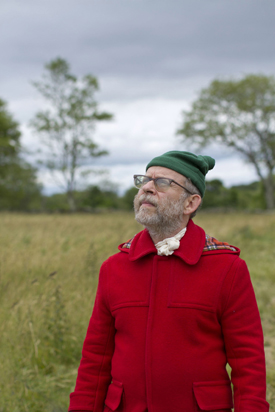
Jared, can you tell us anything about working with Bruce [Willis], and Kara, can you speak to working with Bill [Murray] and Fran [McDormand] at all?
JG: Bruce was awesome. He was great. And in a way, he didn’t necessarily flat out tell me this. It’s just something I picked up. It’s a great idea to really run lines with whoever you’re with in your scene before you actually do the scene with that person. It’s good for many, many reasons, like memorization, just overall preparation in general and to know how you’re going to act and react off of the person you’re with. Yeah, he was great.
KH: Well, Bill and Fran were and are amazing people. It was such a blessing and an honor to meet and work with them so closely. They were very sweet and down-to-earth. And Fran, she gets to know everyone. She likes to become close to everyone she works with. She is very intelligent and a complete inspiration, I think, to everyone who meets her. And Bill, he is hysterical. You’re always laughing when Bill’s around. He is a ray of sunshine.
This is a film about adolescence written by somebody older, right? And I was wondering two things. One is what did you connect with as adolescents in the film, and how did you create the characters’ persona, experiences, sense of loneliness, from watching your friends and your family. And two, what did Wes tell you specifically about the psychology of your characters?
KH: Well I think that I did have a couple of smaller, more interesting connections with Suzy. She loves animals and reading. But other than that, we are very different people with our experiences, and our stories and our personality. For psychology, she is a very lonely, misunderstood young woman who runs away with Sam because she feels he understands her. And in many ways, he does. They do understand each other. They connect.
JG: Yeah, like Kara with Suzy, our characters, Sam and I are very different. I can relate to him in the sense of just fitting in in general. I feel like every preteen has to go through that. And also, Wes had me watch a movie Clint Eastwood, Escape from Alcatraz. Kind of just like because he showed me some similarities on Clint Eastwood’s character and mine in the sense that they’re all very resourceful, capable, and I kind of got to see that through that movie.
The young actors are released, and we are joined by Bob Balaban, Edward Norton, Wes Anderson, Jason Schwartzman and co-writer Roman Coppola.
I’d like to ask each one of you what was the first thing that came into your mind when you’d heard that you come to Cannes?
RC: Well I remember Wes called and said it’s really official. It’s not announced yet, but I think we’re opening night, and it’s obviously very thrilling, and I had seen the movie on video without the effects and I was like, ‘wow, it would be great to see the final film and celebrate with a huge audience in a beautiful theater,’ so it was a thrilling call to get.
JS: Yeah, first of all, everything that Roman just said, I second. And, in addition to that, I guess I was just really excited for Wes knowing how hard he worked on the film, how long, and how much the movie meant to him, and to see that acknowledgement, I was just really happy for him. Still happy for him, and standing on the steps the other night, I could imagine what he was thinking. Must be a lot of joy for him.
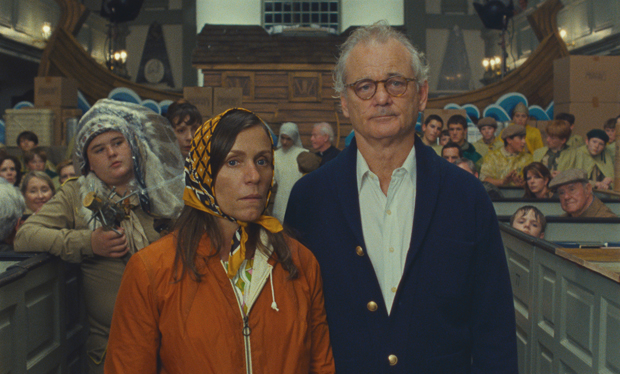
WA: I was with a group of French people when I found that out, and I said we’ve been waiting, like, three months or something to hear anything, which I have never submitted a film to Cannes before, so I thought we’d sort of hear the next day. We didn’t hear anything for a long, long time, so I thought that’s probably not a great sign. Then I got the call, I hung up the phone, I told my friends, opening night. And, all of them said that won’t be in competition. But then later, we found out it was in competition, too. It was great.
EN: The first thing I thought was, ‘well, it’s about time,’ because I think of Wes as a filmmaker who I would think would have had about five or six films in Cannes by now. It’s good that they finally got with the program that acknowledged one of my generation’s really great auteur filmmakers, and the second thing I thought was that I would get to have those nice, little marzipans again they serve at the Cannes press junkets.
BB: Well, like everybody else, I was really happy for you, Wes, for the movie because it was such a labor of love for everybody, but obviously, it’s your labor that gave birth to the whole thing. And then, I thought about what to wear.
Thank you so much for such a wonderful, imaginative journey. My two questions are related. One is how much is this movie about art? And how does music [play a role in that art]?
WA: I like that. I have always loved and for many years the movies that have most inspired me, especially in a sort of visual way, are the Michael Powell and Emeric Pressburger films, and I always thought those were so much of that work is about making these visual, and they’re quite artificial, films, and there’s something very exciting about what they made that’s in front of the camera. And, The Red Shoes, in particular, that’s the subject matter too. But one of my favorites is The Life and Death of Colonel Blimp, and it’s very, very vivid. And also, Black Narcissus is a movie that’s in the Himalayas, and they all end up wherever they did, and you really are transported to that place, but you feel that someone has made these things, and they’re very emotional, moving films. And, I would also say Emeric Pressburger is a very good inspiration for music as well because The Red Shoes, it’s a movie where there’s a very long sequence where the music was written first and the movie was made to the music. I mean, it’s a dance, so it makes sense, so anyway, that’s part of it. And, our movie, this Benjamin Britten music that we use, a lot of that, the movie was sort of choreographed to it, and we drew a lot of the scenes and semi-animated them, and so we knew where the cuts were going to be based on the music.
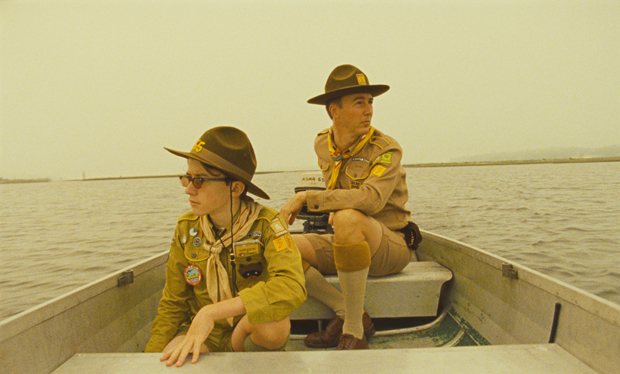
Some of your aesthetic choices have a nostalgic… I was curious if there was any specific impulse to finally do a period piece?
WA: It became a period picture when I was writing Bob’s part of this narrator who introduces us to the movie and it was really sort of spontaneous of me. In the fourth sentence or something I wrote that he talks primarily about the weather. Somewhere, I wrote him saying what year it was, and I had not had the intention to set it in the past, but I sort of followed that. As Roman and I worked on it, it became more and more part of it, and I started feeling like it was a Norman Rockwell kind of America, one that was about to change. There’s a scene in the movie where it’s the end of the summer, and maybe it’s also supposed to be the end of some kind of metaphorical summer. Maybe it’s a stretch, but you get the idea of it.
JS: Well, for me, I will try to say this quickly so I do not bore you, but for me, my feeling is that Wes spends a lot of time constructing these movies, and they’re very intricate, and delicate, and they are balanced, and I feel like if I could make a bad musical metaphor, he’s a composer and a conductor of a very detailed piece of music with a lot of counterpoint and stuff and as a musician, there are certain pieces of music where musicians, I mean, there are all different types of music, but with this type of music, it’s very important to help the composer and conductor keep the piece of music in balance and help support the balance, and in terms of high school, I never felt more creative than when I was in high school because tomorrow, you’ve got a paper due. It should be this many words long. You have to include these topics but do it how you like, and I feel like the more points you have to hit, I personally feel more excited and more creative than someone who just does whatever. It just feels a little bit scary to me. Now, that also might be because my first time ever acting was with Wes. So it’s a style that is the more comfortable style for me. I hope that was great. I hope that is the incredible answer you wanted.
And for Edward, this is the first time acting with Wes. Do you want to address that briefly?
EN: Yeah, I mean, not to reference Fifty Shades of Grey, but sometimes there is freedom in bondage. I think Jason’s right that what might look like a very managed environment is actually providing an actor with a lot of rich fodder to interact with, and when certain things are predetermined, then other things that are improvisational, out of it, like when I watched the film, I laughed remembering Wes had this wonderful long tracking shot of the Scout Master with all the boys and their various activities and endeavors, and one of them, they’re making fireworks, and we sort of notice when he’s smoking, so the presence of these fireworks becomes the reason to have this whole conversation, those are the kinds of things that emerge because of the fun kind of restricted way the shot is set up that on a more fundamental level, I never associated Wes’ characters with the comedic qualities or the humor of Wes’ films is to me always dry down to the characters, who are deadly serious, like none of Wes’ characters are anything less than urgently sincere about what they’re doing and their intentions. And, that’s the easiest thing in the world to play. It doesn’t matter if it’s a tracking shot or whatever Wes is doing is irrelevant because he constructs characters who are deeply earnest, and sincere in their intentions, and so much so that that’s sort of where some of the comedy lies, but when you’re an actor, like Wes draws a really well defined path toward the main thing that you need, like what does this person want, what do they care about, what are they trying to do, and so I think that’s the greatest gift to an actor, giving this character what it wants in life.
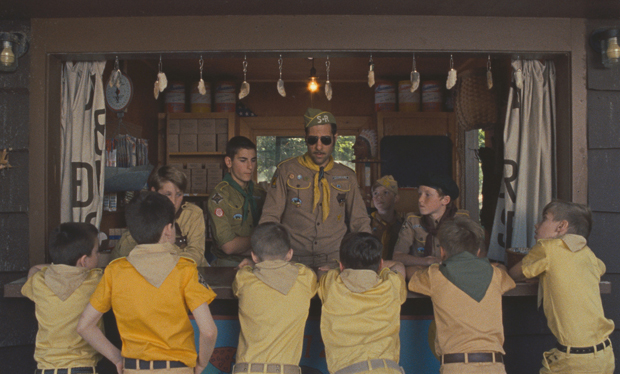
Bob, would you like to add anything?
BB: Wes, to me is the perfect kind of dictator, and he gives a tremendous relief to an actor to come into a situation and know what the parameters are. And I know the first time I came in, you showed me literally the first sequence of me in all these different locations with you being me, and just this little head at the bottom of the frame, and all these great locations in the background, without really telling me anything about what I was supposed to be doing, showing me that was all I really needed to know to kind of know this is what this is about, this is what it’s going to be about. The thing I want to say, it’s not about acting in the movie, but what I was so surprised about, being in it and then seeing the movie is it’s very full and it’s very crammed in many ways, and I think that’s the great power of the movie is that within the formalities there’s this tremendous emotional life sort of coursing through it, which I was very unaware of. I didn’t see it when we were there, and I think somehow that the structure of being so firm and organized has allowed this powerful emotion. I think we all had the same experience when we watched it for the first time. It’s amazing that something that you would think could have squeezed the life out of something allowed it to be powerful, and watching the eight million people watch the movie the other night, they seemed to have the same experience that we all had, which was that there was a huge amount of freedom and spirit that was nurtured by something that you would have thought might have destroyed it.
EN: I have great respect for Wes’s specificity of language and script dialogue. Wes is a craft student, and he cares about words that I have no impulse to casually monkey with. I don’t think he did very much monkeying with dialogue after all, but I’d say that if there was improvisation, it was coming from Wes, like actually my favorite improvisation was the Scout Master after the kid says, ‘what’s your real job?’ and he says, ‘I’m a math teacher.’ ‘What grade?’ ‘Eighth grade.’ Then they stop. We did a couple takes, then Wes said, ‘actually, I want you to walk back in, and I want you to say ‘I want to change my answer, and say this is my real job.’ He kind of came up with that at the moment. That wasn’t in the script, but there’s a lot of things you could make up, I agree with you. He goes from very confident to very insecure to dead rising to his moment, in a way, the value of scouting being confirmed, let’s say, but I don’t think Wes’ movies aren’t the places you stray off the script too much.
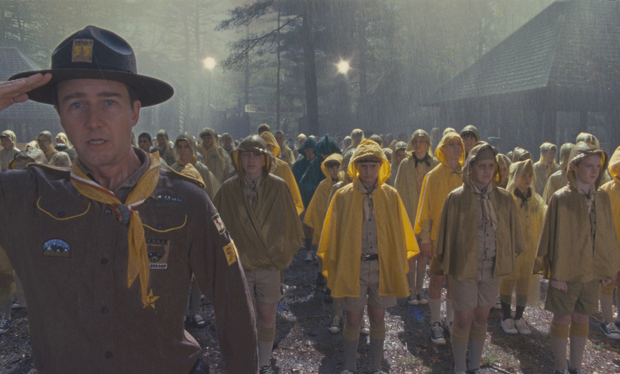
Wes, it seems to be a ritual in American movies, especially family movies, that you don’t kill the dog, and you killed the dog in this movie and kept right on going. So, did you do this because it was a ritual and thought it would be worth it killing the dog?
WA: Well, I’ve killed dogs before in my work. You know, it never goes over that lightly. One of them, you had a car run over it, but you just saw the leak. This one is a more graphic depiction of it. I did not intend it as a confrontation, but I will say this. I will speak to the process of it. When we shot at first, I said, ‘you need a great dummy for this dog because there is nothing worse than an obviously fake dead animal.’ And after you see this, we went alone, and our prop master was overwhelmed, he, on the day, finally produced a fluffy terrier. Under the pressures of time, I shot the scene and it was a deeply humiliating experience of watching the day waste, because I have some standards, and we ended up reshooting the scene. I said to shoot it, we’re going to have your best dog, and the day came, and the actual dog was brought to the set. I said ‘what is that?,’ and the trainer called the dog to lie still and the dog died in front of me. It was completely immobilized in a whole breath, and it was done the first time. We had the trainers, we had the dog, so that’s a real dog.
EN: The theme of that story is trust your actors.
I just was curious about the writing process. Wes has such a singular voice but are very obviously co-writers involved. I was wondering what the process is and what you do to prepare.
RC: We’ve had this project for a while, and it was known as the Island. I would ask, ‘how is the Island movie going?’And, it was just something that was on his mind. Wes started to work on his next project, and I wasn’t involved, and I would check in. I would read the first. And, I remember a few weeks later, I asked ‘what’s next?’ And, he said ‘I don’t have anything.’ There were a couple disappointing check-ins where there just wasn’t much progress, but anyway, we got together and I started to be a little demanding. And, it was in those sessions of chatting and asking, and trying to learn more about the movie that we started getting on a roll. And some of the questions I asked were answered, and revealed that we had a good rapport that kind of helped draw it out, but as Wes said, the director is very much the artist who could see this thing, and I was sort of the person there who could hear the story and help draw it out.
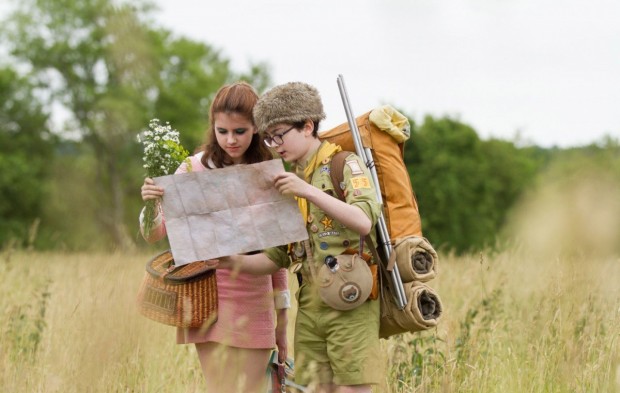
Moonrise Kingdom hits theaters on May 25th.
